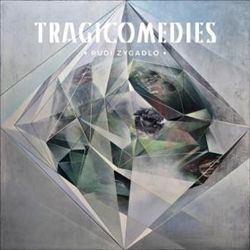Artist: Rudi Zygadlo
Album: Tragicomedies
Scotland’s Rudi Zygadlo was introduced to me, for his 2010 debut the Great Western Layman, as a maker of something electronic called “dubstep”. He does do clever things with electro-sonic manipulation, about which more shortly, but that label slowed my recognition of what on  Tragicomedies is at least as important: he writes excellent, distinctive vocal melodies. They’re graceful, and modest in scope, but full of odd intervals, sharps or flats where none would be expected. They have a composery feel, and at first the only comparisons I thought of — once my brain had caught up — were hopelessly obscure: Liam Singer, Chris Letcher, Stars in Battledress, William D. Drake. But no, by Russian Dolls I’d realized his tunes might pass as slowed-down fragments from Broadway’s Stephen Sondheim (Into the Woods, Sweeney Todd, Assassins). By Tragicomedies itself, aided by the arrangement, I’d recognized Zygadlo‘s sometime kinship as a tunesmith with Steely Dan (or Francis and the Lights). By the Domino Quivers I’d picked up on the resemblance to some of XTC’s slower, more pastoral songs. Sometimes even Crowded House recorded songs that were a little evasive in their prettiness. There, now you have starting points.
Tragicomedies is at least as important: he writes excellent, distinctive vocal melodies. They’re graceful, and modest in scope, but full of odd intervals, sharps or flats where none would be expected. They have a composery feel, and at first the only comparisons I thought of — once my brain had caught up — were hopelessly obscure: Liam Singer, Chris Letcher, Stars in Battledress, William D. Drake. But no, by Russian Dolls I’d realized his tunes might pass as slowed-down fragments from Broadway’s Stephen Sondheim (Into the Woods, Sweeney Todd, Assassins). By Tragicomedies itself, aided by the arrangement, I’d recognized Zygadlo‘s sometime kinship as a tunesmith with Steely Dan (or Francis and the Lights). By the Domino Quivers I’d picked up on the resemblance to some of XTC’s slower, more pastoral songs. Sometimes even Crowded House recorded songs that were a little evasive in their prettiness. There, now you have starting points.
So about that electronic tomfoolery. First of all, Zygadlo‘s voice seems mild and pleasant – like Roddy Frame of Aztec Camera, or Paddy McAloon of Prefab Sprout – but we don’t hear it untampered. There’s often several of him, pitch-corrected in harmony, or sent through a vocoder (a la Laurie Anderson on O Superman), or chipmunked, or deepened into a robotic Big Bopper (especially on the doo-wop Waltz for Daphnis), or sent through a dozen other forms of distortion. Instrumentally, many songs are based in classically-trained piano, but electronics will wobble the pitch, fade the notes artificially in and out, slow down or briefly warp-speed the playing. Some shiny keyboard lines are purely artificial, such as Catharine‘s synthesizer insisting a grin while it tries to distract you from its machine indigestion; I guess that’s dubstep, though without Skrillex’s abrasiveness. Some sound like ’70s Wurlitzer organs; Tragicomedy sounds, specifically, like Steely Dan mixed on a computer while my 4-year-old jabbed at the keys and tried to swipe the mouse. The Deaf School could even play in goth or ’80s dance clubs, though not without inspiring questions.
By final tracks On and Variously Made Men, it feels entirely natural that people have electronic filters attached to their vocal cords; that notes sound louder half-a-second *after* they’re played; that instruments rebuild themselves from scratch from one measure to another. Tragicomedies creates its own world of pop elegance.
– Brian Block
To see the rest of our favorites, visit our Favorite Albums of 2012 page!
